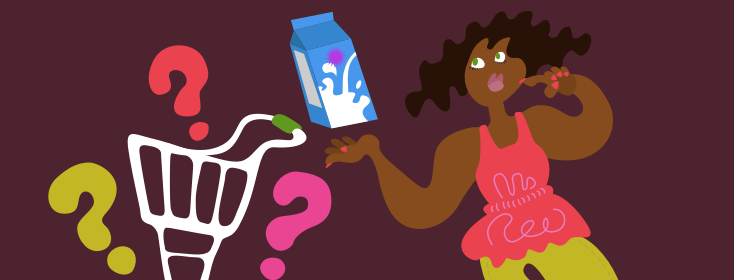Estrogen and Endo: Dietary Tips
Estrogen and endometriosis are connected, and being aware of the shared connection means that there are things some people can do to lower their exposure to estrogenic chemicals and plant compounds. This may, in turn, help with symptoms, and could even potentially slow down the progression of the disease.
Diet is perhaps the single greatest area where we can make changes to lower our estrogen exposure. Some things that we eat and drink may actually contain either phytoestrogens (plant estrogens) or xenoestrogens (chemicals that mimic estrogen in the body).
Reconsidering soy
One big phytoestrogen that forms the staple of many people’s diets is soy. There is actually some conflicting data out there about soy and its effects on endo and other reproductive diseases and cancers. Some studies support soy as beneficial, and others report that it is harmful.1 My personal, anecdotal experience seems to veer toward the latter. While some soy doesn’t seem to affect me too much (and as a vegetarian, I come across soy more as option in my meals), I find months that I eat too much of it, my symptoms flare very badly.
Some research suggests that the form and type of soy consumed can also matter. Historically, Asian diets that depended on soy as a dietary staple actually fermented it before eating it. This fermentation process helped get rid of some of the more harmful compounds found in soy that can be detrimental to endo.2 However, nowadays, most soy on the market tends to be hyper-processed, using chemicals like pesticides to grow and aluminum in acid-washing the beans prior to production. So, usually the more processed the soy product, the more negatives effects it can potentially have on endo. This can include milks and mock meats and cheeses made from soy. If you do opt for soy in your diet, opting for organic and fermented soy products if possible (miso and tempeh tend to be more likely to be fermented), and eating it sparingly, might be helpful.
Eating organic
In general, eating organic whenever possible is also a good way to lower exposure to xenoestrogens. Pesticides and herbicides can disrupt the endocrine system3 and in theory contribute to or exacerbate reproductive diseases. If you cannot always afford organic (I am on a tight budget myself so have months where this is harder), wash your fruits and vegetables well with a mild fragrance-free castile soap or soak and rinse in a water and vinegar or lemon juice solution. You can also skin vegetables and fruits where this is an option-- like apples, potatoes, zucchinis, etc.-- as pesticides are usually more present on the top-most layer of foods.
For animal products, opting for meat and milk products that are organic can also reduce exposure to hormones and steroids used in the animals (such as the growth hormone rBGH, which has been shown to have an impact on endometrial tumors).4 Red meat can in particular be problematic for endo, even when it’s organic.5 You should possibly steer clear of whole milk and fatty cheeses as toxins like dioxin, tend to be stored in fat.6 As such, going for leaner meats like chicken or low fat/skim milk and cheeses with less fat might also be beneficial.
Balance is key
Eating a diet that includes at least some [organic] cruciferous vegetables such as broccoli, cabbage, cauliflower, brussels sprouts, collard greens and kale might also help. These veggies contain a compound known as indole-3-carbinol, that is known to have an anti-estrogen effect in the body7 and therefore have had some beneficial effects in studies on reproductive diseases and cancers8. Yet, as with other phytoestrogens, too much has indicated a counter-effect (making it harmful), so you don’t want to overdo it. Balance is key.
Are you getting enough zinc?
Finally, you might also want to make sure you are getting enough zinc. Zinc is a natural aromatase inhibitor--meaning it suppresses estrogen in the body.9 A 2014 study found that the women who participated with endometriosis tended had significantly decreased levels of zinc compared to women who did not have the disease.10 Please be careful not to take too much of it either, though, as high levels of zinc can also make one sick.
What dietary habit or changes have worked for you in reigning-in estrogen and curbing your endo symptoms?

Join the conversation